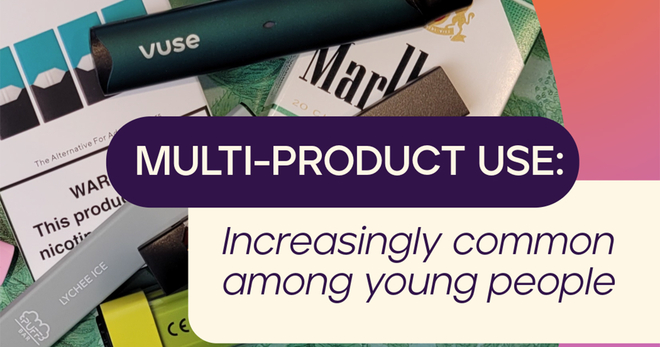3 important things to know about quitting nicotine during times of stress
Nicotine addiction – whether through smoking, vaping, or other tobacco products – can increase stress levels, and quitting nicotine can improve mental health.
According to new Truth Initiative survey data, about two-thirds (67%) of young adult nicotine users ages 18–24 plan to quit for the 2026 new year, and most reported that their top reason for quitting was to improve their mental and physical health.
According to a meta-analysis of 26 studies, quitting smoking is linked with lower levels of stress, anxiety, and depression, as well as improved positive mood and quality of life compared with those who continue to smoke. A Truth Initiative survey of young people who quit vaping nicotine also found that 90% of those who quit vaping said they felt less stressed, anxious, or depressed.
Quitting nicotine is difficult, and stress from work, school, relationships, and the daily demands of life can be a trigger to use nicotine. Nicotine withdrawal can amplify feelings of stress and anxiety, and the idea that nicotine eases stress has also been perpetuated by the tobacco industry.
Given these two factors – the cycle of nicotine withdrawal combined with tobacco industry marketing – it’s no wonder that people have misconceptions about nicotine use and stress. Stress can present challenges for people who want to quit nicotine, but these challenges are manageable, especially if you know the facts about nicotine and stress.
For people of all ages quitting any type of tobacco or nicotine product, daily reminders and a community of support can go a long way. EX Program by Truth Initiative and Mayo Clinic is a free, digital quitting resource that offers a personalized quit plan, interactive reminders, and access to the nation's most established online quitting community to help people stay quit during times of stress.
Here are three important things to keep in mind about quitting nicotine during times of stress.
Nicotine withdrawal causes stress and anxiety
There is a common misconception that nicotine relieves stress, anxiety, and depression. According to a 2021 Truth Initiative survey, 4 in 5 young people who used e-cigarettes said they started to vape to lessen their stress, anxiety or depression. This belief is linked to the experience of nicotine withdrawal and the impact of nicotine on the brain.
Nicotine releases dopamine, the feel-good chemical that creates the sensation of pleasure and relaxation. When the body stops receiving nicotine, dopamine levels drop and feelings of pleasure are replaced with an urge to use nicotine. Irritability, anxiety, and depression are some of the symptoms of nicotine withdrawal, and using nicotine relieves these symptoms temporarily. It’s critical to recognize that the cycle of nicotine withdrawal, subsequent nicotine use, and alleviation of symptoms starts with nicotine addiction in the first place.
The tobacco industry has marketed nicotine as a tool for stress relief
The tobacco industry has also invested significant resources in marketing tobacco products as stress relief. From an early Camel cigarette ad that depicts a relaxed smoker with the text, “It’s a psychological fact, pleasure helps your disposition. For more pure pleasure – have a Camel,” to a pandemic isolation-themed Puff Bar ad calling the e-cigarette brand a way to “stay sane” and “the perfect escape from back-to-back zoom calls, parental texts, and WFH stress,” the tobacco industry often depicts its products as tools for stress relief.
Smoking and vaping also come with behavioral aspects that have contributed to the misconception that smoking or vaping can reduce stress. Smoking and vaping often creates social opportunities to connect with other people and can provide a break or distraction from stressful situations.
Quitting “cold turkey” is unlikely to work
Whether it’s cigarettes, e-cigarettes, or any other tobacco product, trying to quit “cold turkey” – meaning to stop abruptly without any support or replacement medications – is unlikely to be successful. Nobody should have to “white knuckle” through quitting nicotine - it's more difficult, and less likely to last.
For people who are trying to quit, access to a network of support – such as counseling, nicotine replacement therapy such as nicotine gum or patches, digital tools, and encouragement from friends or family, can make all the difference. In fact, medications and counseling can more than triple a smoker's chances of quitting when used together.
Evidence-based quit resources can help
EX Program, a comprehensive digital cessation intervention developed by Truth Initiative with Mayo Clinic, is designed to meet the unique challenges faced by people quitting smoking, vaping, or any tobacco product. With personalized quit plans, interactive support, advice and tips from Mayo Clinic, and 24/7 access to the nation's most established online quit community, EX Program offers the proven, evidence-based tools that people need to find a quit that sticks. People quitting any type of tobacco or nicotine product can sign up for EX Program and browse blog posts from Mayo Clinic cessation specialists and read tips and experiences from fellow quitters and former tobacco users about coping with stress while quitting.
A randomized clinical trial among young adults published in JAMA Intern Medicine found that EX Program text message support can increase the odds of quitting by up to 40%. A similar study also found that teens who received the program were 35% more likely to report not using nicotine 7 months later.
Join EX Program for free by texting EXPROGRAM to 88709.
By texting EXPROGRAM to 88709, you consent to recurring messages from EX Program to help you quit vaping, and agree to the Terms & Conditions and Privacy Policy. Text STOP to opt-out. Text HELP for info. Msg & Data Rates May Apply.
This article was originally published on March 23, 2023.
More in emerging tobacco products
Want support quitting? Join EX Program
By clicking JOIN, you agree to the Terms, Text Message Terms and Privacy Policy.
Msg&Data rates may apply; msgs are automated.


